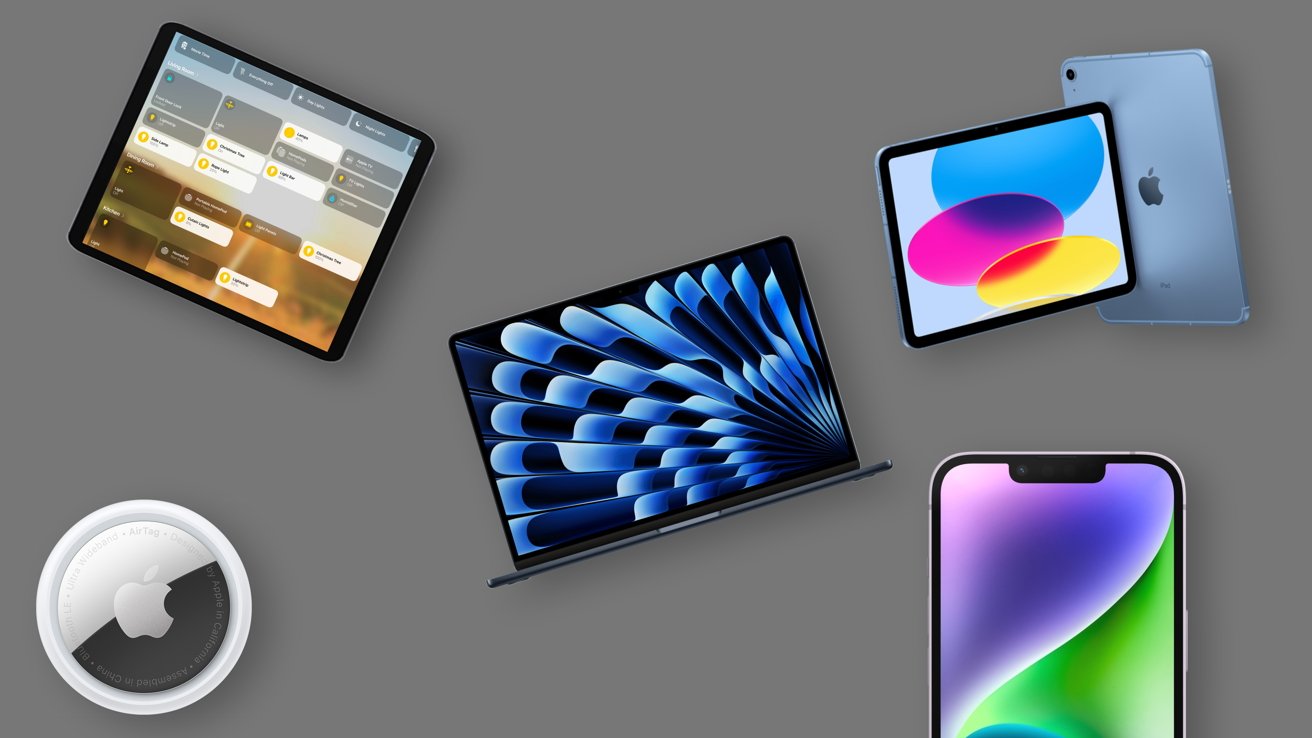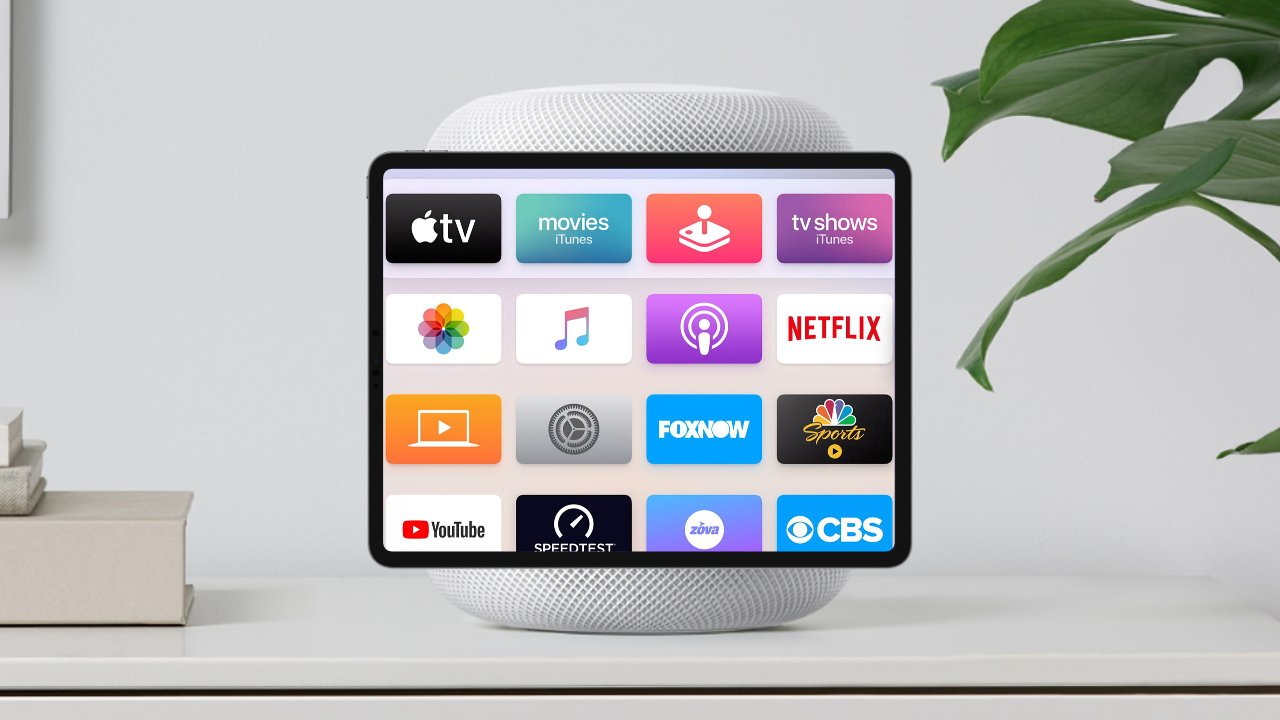Apple is set to have a packed spring with an AirTag refresh, the AI-powered Home Hub, an M4 MacBook Air, iPhone SE 4, iPad 11, and possibly more. Here's what to expect.

Apple's early 2025 is packed with possible product announcements
Rumor season never ends, though it never fails that one leaker or another predicts every hope and dream is set to release at once. Evidence continues to pour in suggesting that it'll be a busy quarter for Apple, but there's always room for products to shift.
Most of Apple's product line has been updated since the start of 2024 with a few exceptions. The M4 chipset could make its way to the final holdout Macs, and new products could emerge as well.
Here's what is rumored so far for early 2025.
Apple Home Hub -- possible
The mythical Apple Home Hub, AI repeater, robotic assistant, or whatever you want to call it this week could finally be revealed in March 2025. Though, the initial version may not be quite the revolution some have expected from an Apple Home display.

A HomePod with a screen has been rumored for a while, but it could be the Home Hub
A model with an AI-powered robotic arm could still come at some point and cost north of $1,000, but the first so-called "Home Hub" will be more of an iPad-like tool. The small square-shaped display would stand alone, show data with a UI like StandBy mode on iPhone, and be mounted to different stands based on the needed context.
Rather than be a full iPad product, it would have just enough operating power to show information. Users could watch videos, view the weather, make FaceTime calls, or control HomeKit devices from the display.
Some rumors suggest the hub could act as a sort of Apple Intelligence relay that would provide the more advanced Siri to products like the HomePod, HomePod mini, and Apple TV. However, that seems unlikely given the proposed price point and functionality.
Apple is reportedly expecting there to be multiple units in a single household, signaling a low-powered device. They would be sold for less than $300 each and could be paired with accessories like speakers, docks, and stands.
Home Hub could mimic the StandBy UI
Users would be expected to carry the display to whatever room they were in. The Home Hub could be a bedside clock, a music player, a recipe viewer, or photo frame depending on the context.
Sensors would detect the number of people in the room and who was looking at it. The UI could adjust based on the distance of the viewer, which would make information more dense the closer they got.
If Apple does reveal the Home Hub, it's the big product of the spring season. Everything else is a chipset upgrade or similar.
M4 MacBook Air -- likely
The 13-inch and 15-inch MacBook Air could get the M4 processor in early 2025. Like with the MacBook Pro update to M4, very little else is likely to change.
The MacBook Air could get M4
Apple could add the improved 12MP Center Stage camera and introduce better external monitor support. Otherwise, the case design would remain the same, and they would still use Wi-Fi 6E and Bluetooth 5.3.
The M4 processor shows a considerable 25% performance boost in the MacBook Pro when compared to the M3 model. Customers can expect a similar performance improvement for the MacBook Air.
Apple is likely to keep the pricing structure identical, with the base model offering a 10-core CPU, 10-core GPU, 16GB of RAM, and 256GB of storage for $1,099. Upgrades will likely max out with 32GB of RAM and 2TB of storage for $2,099.
iPad 11 -- likely
Like the MacBook Air, the iPad is Apple's lowest price point for the product line and most popular. The eleventh-generation tablet isn't expected to see many changes beyond a processor bump.
iPad 11 would get a chipset bump and possibly Apple Intelligence support
Basically, nothing concrete has been shared about the impending iPad 11. It'll have a better processor, but it isn't clear which one.
Previous iPad models used the iPhone's A-series processor in sequence, but since the iPad 10 got the A14 in 2022, Apple could jump to the A16. However, the minimum chipset for Apple Intelligence is the A17 Pro, and Apple is unlikely to include the pro-grade chip in the budget tablet.
Yes, the A17 Pro is used in the iPad mini, but that is likely an exception, not a rule.
That brings us to A18, which is used in the iPhone 16 and iPhone 16 Plus. If Apple wants to continue the trend of including access to AI in every new product it releases, the A18 is the most likely chipset -- which is an astronomical leap from the A14.
The other expected and more obvious change will be to Apple Pencil support. The iPad 11 will almost certainly support the Apple Pencil with USB-C and the Apple Pencil Pro. That would be the end of modern support for the first two generations of Apple Pencil.
If Apple does indeed move to A18 while maintaining the same entry price of $349, it would be the lowest-priced product with access to AI. Though, it isn't an outlandish idea given what's rumored for Apple's budget iPhone.
iPhone SE 4 -- likely
There has been a mountain of rumors about the iPhone SE 4, but mostly due to Apple's experiments with an in-house modem. While an in-house modem may still happen, users will be more concerned with the design and chipset in use.
iPhone SE 4 could take on the iPhone 14 design
The iPhone SE 3 was released in 2022 with an iPhone 8-like design and still sports a Home Button with Touch ID. Rumors suggest Apple could introduce an iPhone SE modeled after the iPhone 14, signaling the final demise of the Home Button.
A lot of device upgrades would be coming with the new design -- OLED, 12MP camera, and a notch with Face ID. There is also some chance of the Action button arriving on iPhone SE, but that's a long-shot rumor.
Like with the iPad 11, it seems unlikely that Apple would release a new product that can't access Apple Intelligence. It is likely that Apple would use the A18 despite it being the latest chip, but that would ensure the longevity of iPhone SE 4.
Expect Apple to target the same $429 price point.
An Apple Watch SE update could also be revealed, but nothing has been leaked about the budget watch. The current second-generation model was released in 2022 and uses the same S8 SiP found in Apple Watch Series 8, so it may go a little longer without an update.
AirTag 2 -- possible
A new AirTag could be revealed with improved Ultra Wideband features and the new UWB chipset -- which is definitely not called U2. Initial rumors suggested the new AirTag would somehow tie into Apple Vision Pro, but that seems less likely as an initial feature set.
Apple's AirTag could get an updated UWB chip
Rumors began to solidify around the updated product in 2024, suggesting the design would remain the same but tracking would improve. The longer range and better tracking would rely on the new UWB chipset.
The original AirTag launched in 2021 with a lot of controversy around potential for stalking and need for an interoperability standard. Despite the uproar, AirTag has proven to be a popular product, and an update makes sense.
Apple did open up Find My to third-party tracking items, so it seems unlikely that Apple would introduce any other form factors for the tracker. The coin design requires additional accessories to be attached to bags or other products.
AirTag is currently $29 for one or four for $100. Customers can engrave initials or emojis on the surface.
iPad Air -- unlikely
Some rumors suggest Apple could update the iPad Air to an M4 chipset in early 2025, but that is inconsistent with its usual strategy with the product. Rumors haven't said much about the iPad Air otherwise.
iPad Air got M2 in May 2024
Apple updated the iPad Air with M2 and the iPad Pro with M4 at the same "Let Loose" event in May 2024. It seems absurd to suggest Apple would update the iPad Air with M4 less than a year later and bring its performance on par with the "pro" tablets.
An M5 iPad Pro is possible in 2025, but also unlikely given the 18-month or more cycle the product is currently on. So, if the iPad Air ends up with the same chipset as the iPad Pro, then the only reason customers would choose the higher-priced models would be for the new design and tandem OLED displays.
Apple did move the iPad Air to a similar two-sized lineup with the move to M2, and with that, they gained the previous Magic Keyboard cases. However, those $300 and $350 accessories are half the price of the iPad Air and likely not great options for that market.
A new set of Magic Keyboard accessories could be introduced with a lower price point. Customers have lamented the loss of the Smart Keyboard Folio, so perhaps Apple could target a new version of that with a trackpad.
That said, something in the supply chain or internal sources suggests an iPad Air with M4 is coming in 2025. While it's not graded as likely, don't count out the possibility entirely, even if it seems like an odd move by Apple.
More to come
The remainder of Apple's product line that wasn't updated in 2024 or early 2025 could see new releases in the second half of the year. There will be an iPhone 17 and Apple Watch Series 11 in the fall, but everything else is a bit less certain.
Mac Studio is due to get M4 Ultra, but not until the summer
M4 Ultra could be introduced in the Mac Pro and Mac Studio during WWDC or sometime in the summer. Upgrades to the Apple TV 4K, HomePod, HomePod mini, or Studio Display could arrive at any time.
The wild card for 2025 is Apple Vision Pro. Some expect Apple could release an M5 model as a spec bump with little other changes.
The slow rollout of Apple Vision Pro in its first year combined with a lack of native software and experiences suggests otherwise. It seems unwise for Apple to release an identically priced headset with more power when the existing model has barely begun to be sold and doesn't utilize the power it has.
The devices mentioned at the top are the most likely contenders for some early 2025 announcements. Given Apple's control over the narrative with its week of Mac reveals in October, a similar approach could be taken in the spring.
